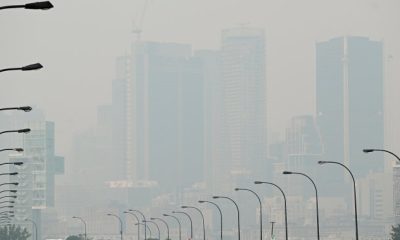Ecowatch
Nigeria’s Local weather Problem Forward of COP27 #AfricaClimateCrisis

Lagos — Within the weeks earlier than the world environmental gathering COP27 in November, Nigeria faces a variety of essential duties to organize for the strong engagement that’s required for Africa’s ‘huge brother’.
The twenty seventh version of the Convention of Events (COP) of the United Nations Framework Conference on Local weather Change (UNFCCC) in Egypt in November is the fifth COP local weather assembly to be held on the continent. Earlier hosts have included Morocco (2001 and 2016), Kenya (2006), and South Africa (2011).
Based on a UNCTAD 2021 report, local weather change constitutes an existential menace to the lives and certainly livelihoods of some 490 million individuals dwelling in excessive poverty throughout Africa. Because the African nation with the most important inhabitants, Nigeria bears a serious chunk of the continent’s local weather impacts in lots of areas.
The nation’s in depth shoreline, stretching roughly 853km, has been receding resulting from overlapping waves that swallow the shores of the Atlantic Ocean in southern area. With sea degree already projected to rise by about 65cm by the flip of the century, an extra erosion of shorelines will deepen the challenges the nation should take care of. Rivers are drying up whereas desertification is taking its devastating tolls throughout the arid zone of the far Northern area.
Lack of biodiversity and deadly floods that ravaged farmlands and cities are different points confronting the world’s most populous black nation. Equally, degradation of tropical forests, depletion of floras and fauna resulting from unlawful deforestation in addition to prison wooden logging, have all been on the rise. On the identical time, deforestation is being exacerbated by the prohibitive value of cooking fuel and kerosene and the digital absence of different clear vitality to be used by the poorest inhabitants.
Local weather change can also be having an impression on agriculture and the hunt for meals safety in Nigeria. It’s a cynical irony {that a} inhabitants of over 200 million individuals is being fed largely by rural farmers utilizing conventional hoes and cutlasses as their main implements. By default, such farmers who will not be agro-tech savvy, can solely domesticate crops which can be topic to the vagaries of unstable weather conditions.
When rainfall is extreme or drought is excessive, farm produce harvests are abysmally poor, leading to a disequilibrium between demand and provide, and inflicting galloping inflation on meals costs.
For a rustic that’s in dire want of industrialisation, irregular energy provide is a serious disincentive for producers and different entrepreneurs at the moment on the receiving finish of local weather impacts. And with barely 3,500 MW of electrical energy technology out there nationwide, factories and companies are weighed down by the hunt for various vitality sources. It’s estimated that over 60 million Nigerians depend on turbines powered by fossil gasoline for about half of the electrical energy required of their houses and companies – and at an enormous value of $14 billion yearly.
The impression of waste is not any much less critical. Nigeria produces 32 million tonnes of stable waste yearly with plastic waste constituting 2.5 million tonnes, and making the nation one of many highest producers in Africa.
Nigeria’s greenhouse fuel (GHG) emission footprint, which is estimated at 126.9 million tonnes as at 2020, is yet one more hazard. As a celebration to the UN Framework Conference on Local weather Change, Nigeria ratified the Kyoto Protocol in 2004 and adopted it up with a Nationwide Coverage on Local weather Change geared toward constructing an environmentally resilient society.
In 2012, Nigeria was admitted as a voluntary member of the Local weather and Clear Air Coalition with the mandate to scale back local weather pollution in ten high-impact sectors of the worldwide economic system. In 2019, in collaboration with the Coalition, Nigeria adopted a Nationwide Motion Plan to Scale back Quick-Lived Local weather Pollution.
President Muhammadu Buhari in 2015 dedicated Nigeria to the Paris Settlement and offered the nation’s pledge to conditionally cut back greenhouse fuel emissions by 45 % by the yr 2030. The Nigerian voice once more resonated final yr on the COP26 in Glasgow, the place Buhari introduced a 2060 net-zero emissions goal. In November 2021, he signed the Local weather Change Act which commits the federal authorities to measurable motion plans for local weather change mitigation and adaptation.
As Nigeria prepares to interact different state and non-state actors at Cop27, Buhari should guarantee harmonisation of the nation’s environmental insurance policies and actions and the on-boarding of all crucial stakeholders in vitality transition, local weather financing, renewable vitality, biodiversity, waste administration, and the media.
The creation of the Nationwide Council on Local weather Change, (NCCC) and the appointment of veteran environmentalist, Dr. Salisu Dahiru, as pioneer Director Normal, are steps consciously taken. It’s hoped that this step will now speed up the nation’s local weather actions and convert the age lengthy movement into quick paced motion.
Forward of the COP27, Nigeria’s essential duties embody an agenda to coordinate Africa’s strategic response to world local weather debates on culpability for green-house fuel emissions, the tardiness in pegging the worldwide warming at 1.5 diploma Celsius above pre-industrial ranges, the dilemma over inexperienced and blue hydrogen choices, and the resistance in redeeming the annual US$100 billion pledged to Africa to finance local weather mitigation and adaptation, amongst. The industrialised nations who’re identified to be culpable for GHG air pollution should be held accountable for local weather change impacts being skilled in Africa right now. Nigeria is obligation sure to guide the cost.
Aliu Akoshile, an environmental journalist, is ublisher and editor-in-chief of Nature Information.
























